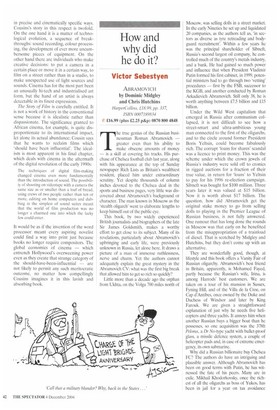How and why did he do it?
Victor Sebestyen
ABRAMOVICH by Dominic Midgley and Chris Hutchins HarperCollins, £18.99, pp. 337, ISBN 0007189834 (?) 06.99 (plus £2.25 p&p) 0870 800 4848 The true genius of the Russian businessman Roman Abramovich — greater even than his ability to make obscene amounts of money — is a skill at covering his tracks. His purchase of Chelsea football club last year, along with his appearance at the top of Sunday newspaper Rich Lists as Britain's wealthiest resident, placed him under extraordinary scrutiny. Yet despite thousands of column inches devoted to the Chelsea deal in the sports and business pages, very little was discovered about Abramovich's background or character. The man known in Moscow as the 'stealth oligarch' went to elaborate lengths to keep himself out of the public eye.
This book, by two widely experienced British journalists and biographers of the late Sir James Goldsmith, makes a worthy effort to get close to its subject. Many of its revelations, particularly about Abramovich's upbringing and early life, were previously unknown in Russia, let alone here. It draws a picture of a man of immense ruthlessness, nerve and charm. Yet the authors cannot adequately explain the great mystery in the Abramovich CV: what was the first big break that allowed him to get so rich so quickly?
Little more than a decade ago the orphan from Ukhta, on the Volga 700 miles north of Moscow, was selling dolls in a street market. In the early Nineties he set up and liquidated 20 companies, as the authors tell us, 'in sectors as diverse as tyre retreading and bodyguard recruitment'. Within a few years he was the principal shareholder of Sibneft, Russia's second largest oil company, he controlled much of the country's metals industry, and a bank. He had gained so much power and influence that when President Vladimir Putin formed his first cabinet, in 1999, potential ministers had to go through two 'vetting' procedures — first by the FSB, successor to the KGB, and another conducted by Roman Arkadievich Abramovich. Still only 38, he is worth anything between £7.5 billion and £15 billion.
Under the Wild West capitalism that emerged in Russia after communism collapsed, it is not difficult to see how a street-smart and ultra-ambitious young man connected to the first of the oligarchs, and to the circle around former President Boris Yeltsin, could become fabulously rich. The corrupt 'loans for shares' scandal was a licence to print money. This was the scheme under which the crown jewels of Russia's industry were sold off to cronies in rigged auctions for a fraction of their true value, in return for 'loans' to Yeltsin to pay for his 1996 re-election campaign. Sibneft was bought for $100 million. Three years later it was valued at $15 billion. Now it is worth about $17 billion. The question, how did Abramovich get the original stake money to go from selling dolls to playing in the Premier League of Russian business, is not fully answered. One rumour that has long done the rounds in Moscow was that early on he benefited from the misappropriation of a trainload of diesel. That is scotched by Midgley and Hutchins, but they don't come up with an alternative.
They are wonderfully good, though, at lifestyle and this book offers a Vanity Fair of Russian oligarchy. Abrarnovich's best friend in Britain, apparently, is Mohamed Fayed, partly because the Russian's wife, IrMa, is among Harrods' best customers. We are taken on a tour of his mansion in Sussex, Fyning Hill, and of the Villa de la Croe, on Cap d'Antibes, once owned by the Duke and Duchess of Windsor and later by King Farouk. We are given a straightforward explanation of just why he needs five helicopters and three yachts. It annoys him when another Russian buys a bigger boat than he possesses, so one acquisition was the 378ft Pelorus, a Dr No-type yacht with bullet-proof glass, a missile defence system, a couple of helicopter pads and, in case of extreme emergency, its own submarine.
Why did a Russian billionaire buy Chelsea FC? The authors do have an intriguing and plausible answer. Although Abramovich has been on good terms with Putin, he has witnessed the fate of his peers. Many are in exile. Mikhail Khodorkovsky, once the richest of all the oligarchs as boss of Yukos, has been in jail for a year on tax avoidance charges. Owning an English football club may assure him of asylum here if ever the need arose. Even at a couple of hundred million, the authors argue, it could work out as a cheap insurance policy.



















































































 Previous page
Previous page